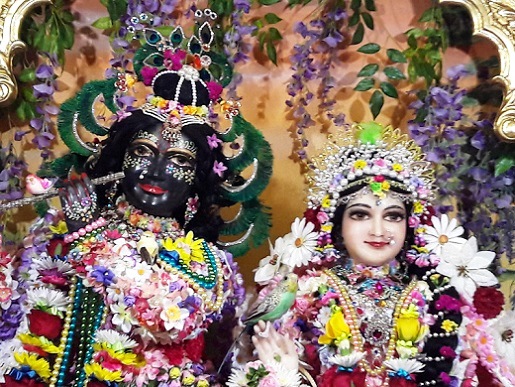(Click to enlarge photo of Radha Govinda, Inis Rath, Ireland)
Prabhupāda: So bhakti is such a nice thing. But what is that bhakti? That bhakti is animittā bhāgavatī. That bhakti should be animittā, not with a motive that, "I shall go to the temple and serve Kṛṣṇa for this purpose." Kṛṣṇa can fulfill any purpose you desire. It is not very difficult for Him, because He is almighty, full with all opulences. So if you want something, material happiness, from Kṛṣṇa, it is not very difficult for Kṛṣṇa. He can give you mukti. But to ask from Kṛṣṇa anything else than bhakti is foolishness. That is foolishness. My Guru Mahārāja used to give this example: just like if you go to a rich man and he says: "Now, whatever you like, you can ask from me. I shall give you," then if you ask him that "You give me a pinch of ash," is that very intelligent?
Similarly, there is a story that one old woman in the forest... I think it is in Aesop's Fable or somewhere. So she was carrying a big bundle of dry wood, and somehow or other, the bundle fell down. It was very heavy. So the old woman became very much disturbed, "Who will help me to get this bundle on my head?" So she began to call God, "God, help me." And God came, "What you want?" "Kindly help me to get this bundle on my head." (laughter) Just see. God came to giving benediction, and she wanted to, "Give this bundle again on my head."
So we are doing the same thing. When we go to God we ask Him, "Kindly give me the bundle on my head. My family become... may happy. I may have a large amount of money to enjoy material things." We ask that. That is our foolishness. Caitanya Mahāprabhu teaches us, therefore, that actually, if you want something from God, that should be only begging for His service. This Hare Kṛṣṇa mahā-mantra means addressing God, "Kṛṣṇa," "Hare," and His energy Harā, Śrīmatī Rādhārāṇī or Lakṣmījī, Hare: "O this internal potency of Kṛṣṇa..." Harā is Kṛṣṇa's internal potency. The external potency is Durgā, and the internal potency is Rādhārāṇī. Jaya Rādhe. So this is daivī-prakṛti. Mahātmānas tu māṁ pārtha daivīṁ prakṛtim āśritāḥ (BG 9.13). The devotees, they take shelter of the daivī-prakṛti, Rādhārāṇī, Lakṣmījī. They worship, therefore, Vaiṣṇava, Rādhā-Kṛṣṇa, Lakṣmī-Nārāyaṇa, Sītā-Rāma, the first of all the energy. The energy. So this Hare Kṛṣṇa mantra is first addressing the energy, the internal energy, potency, of Kṛṣṇa. Hare. From Harā to Hare. That is the sambodhana. So Hare Kṛṣṇa: "O Rādhārāṇī, or Lakṣmī, or Sītā, and Kṛṣṇa, or Rāma, or Nārāyaṇa"—the same thing. Hare Kṛṣṇa, Hare Kṛṣṇa, addressing Them, "O my Lord, O my Lord's energy."
So when you address somebody, you want to ask something. So if they reply, "Yes, why you are calling?" then we're calling, "Please engage me in Your service." This is the prayer, not that, "Give me money" or "Give me beautiful wife" or "many followers." This is material hankering. Everyone wants some prestigious position, lābha, pūjā, pratiṣṭhā, some material profit, lābha, and prestigious position so that people will give him salaam, minister, president, and to become very famous, historically very famous. These are material hankerings. But Caitanya Mahāprabhu says: "No." Na dhanaṁ na janaṁ na sundarīṁ kavitāṁ vā jagadīśa kāmaye (Śikṣāṣṭaka 4). We don't want. This is animittā bhakti. Nimittā, for some certain reason, if you become a bhakta, then you are not a śuddha-bhakta (pure devotee). You are a viddha-bhakta, a polluted bhakta. Pure bhakti is anyābhilāṣitā-śūnyam (Brs. 1.1.11), zero. Material hankerings, anything material hankering, should be void.
(Srila Prabhupada Lecture, Bombay, December 2, 1974)
Photo by Ishani dasi
.
.
